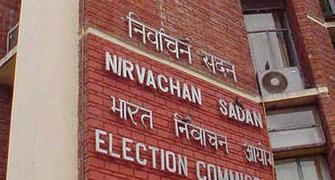With March 2016 being the final quarter when banks will have to disclose their stressed assets, the markets are assuming the worst is yet to come
 Reserve Bank of India Governor Raghuram Rajan delivered on the consensus expectation of maintaining interest rates, at the central bank’s bi-monthly policy review on Tuesday.
Reserve Bank of India Governor Raghuram Rajan delivered on the consensus expectation of maintaining interest rates, at the central bank’s bi-monthly policy review on Tuesday.
What caught analysts’ and economists' interest was the detail given by the central bank in spelling out the potential stress in loans. In the press and analyst interaction, the RBI team divulged some interesting information on stressed assets.
RBI made it clear he losses shown by some of the banks which announced their numbers were after consulting with it and gives a true picture on the extent of stress.
With March, the financial year's final quarter, when banks will have to clearly identify and disclose their stressed assets, the market is naturally reacting by assuming the worst is yet to come.
In an interview, Rajan said RBI was trying to move from the current state of extending a loan and pretending 'everything will be all right' to recognising the problem, putting in resources needed to correct the situation and moving forward. If banks need adequate capital, Rajan said, the government has repeatedly ensured there would be, to absorb the hits.
Why banking stocks will continue to fall post RBI policy RBI also said it would revise the existing guidelines on the recently introduced strategic debt restructuring (SDR) rules and the joint lenders forum (JLF).
These were introduced to empower banks to tackle the growth in toxic assets. There was also a clarification that asset classification will remain on a rule-based accounting basis. Meaning an account can remain a standard one in one bank but will be termed a non-performing one in another. However, the bank where the account is a standard asset will also have to increase the provisioning for it.
A Motilal Oswal report says on account of these changes, the chances are that stresses loans could increase by two to three percentage points. The total provisioning requirement includes stress recognition, an additional 10 per cent provisioning on restructured loans and a further 15 per cent for the '5:25' scheme.
That and SDR would amount to Rs 60,000-80,000 crore (Rs 600-800 billion), according to a Motilal Oswal report. From a stressed loans perspective most banks are adequately capitalised, except some mid-sized public sector ones. However, higher provisioning will result in higher credit costs.
Analysts themselves are tweaking the estimates, based on the numbers being declared by various banks. For, most of the information regarding the actual state of stressed assets were not disclosed earlier. Recently, Morgan Stanley said it was building in a much higher, perhaps even more than double, non-performing asset formation for State Bank of India (SBI), and observed that credit cost would increase by 175 basis points.
The impact of the measures taken by the central bank in this regard will not be over by end-March. Higher credit costs will continue to put pressure on banks. What does this mean for banking stocks?
Morgan Stanley in its SBI note, says the valuation, now at a premium to the smaller ones, will see some catching up by the latter. They have given a price target of Rs 115 for the scrip, which brings the valuation of the bank at 0.5 times its book value. The only way banks can be saved is by huge capital infusion, says the report.
The government is taking baby steps on infusing capital, partly because its divestment plans have failed. Earlier, the proceeds of divestment were used to boost public sector banks' capital but this option is now ruled out. The only hope is for the economy to grow faster and banks gaining from this.
Illustration: Uttam Ghosh/Rediff.com










